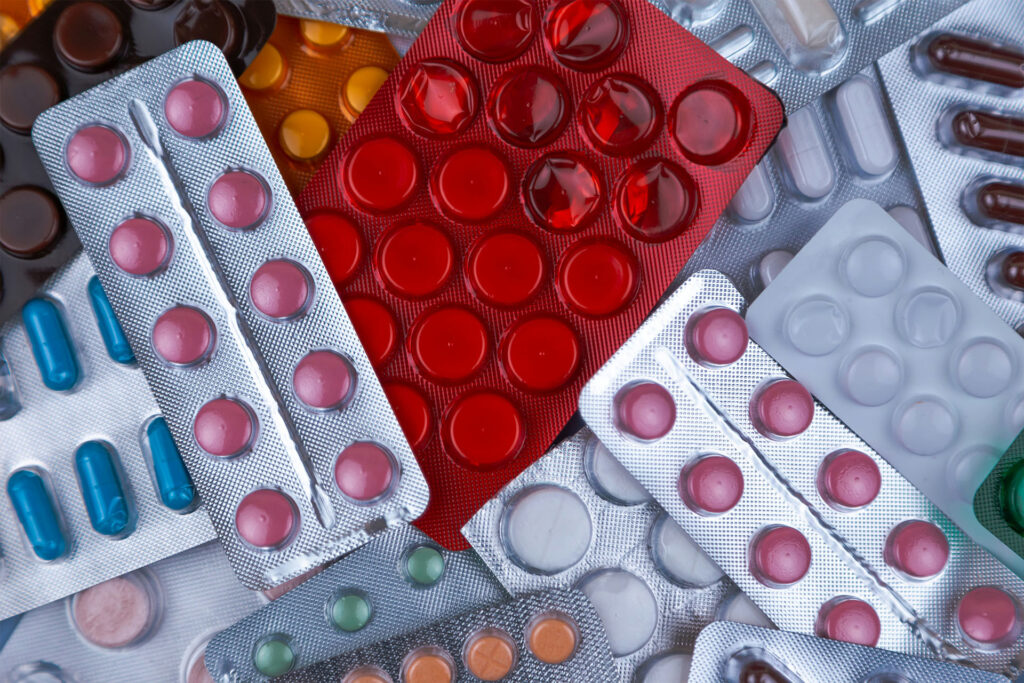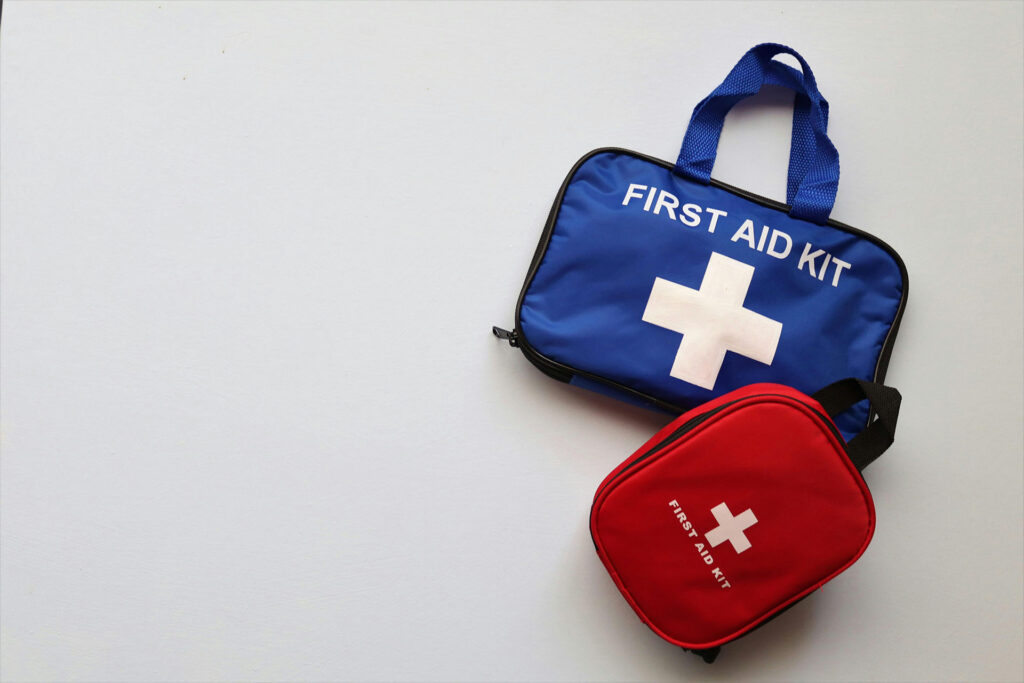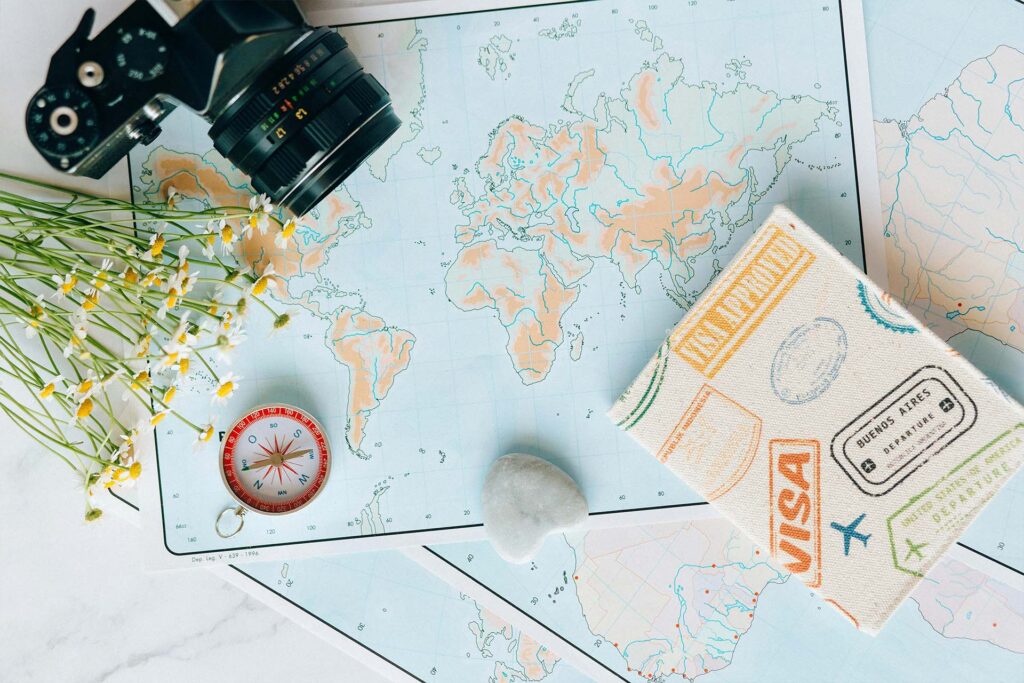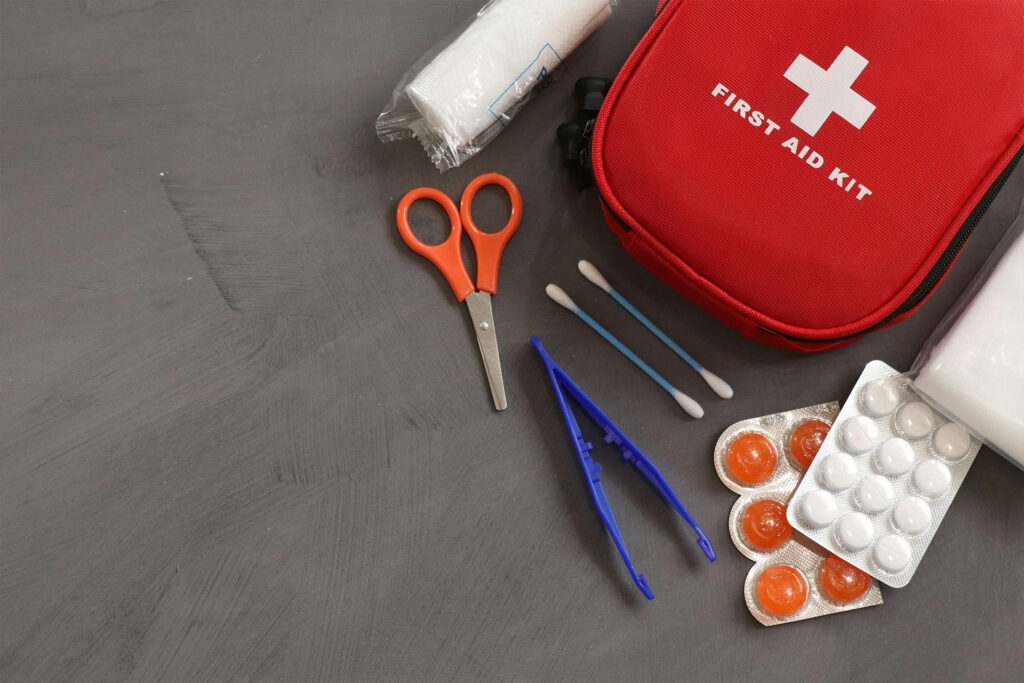Planning a trip? Don’t forget to pack a travel health kit! This guide will help you put together everything you need to stay healthy on your journey. We’ll cover the must-have items for your kit, from basic medicines to first-aid supplies. Whether you’re going on a short trip or a long adventure, we’ve got you covered.
Essential Travel Health Kit Checklist
Medications
- Paracetamol and ibuprofen for pain relief
- Antihistamines for allergies and insect bites
- Loperamide (Imodium) for traveler’s diarrhea
- Motion sickness tablets
- Cold and flu remedies
- Antacids for indigestion and heartburn
- Prescribed antibiotics (if recommended by doctor)
First Aid Supplies
- Adhesive bandages in various sizes
- Sterile gauze pads
- Medical tape
- Antiseptic wipes and ointments
- Tweezers
- Scissors
- Digital thermometer
- Safety pins
Personal Care Items
- Regular prescription medications in original packaging
- Prescription documentation and doctor’s letter
- Spare glasses or contact lenses
- Contact lens solution
- Sunscreen (SPF 30+)
- Insect repellent with DEET
Travel Essentials
- Water purification tablets
- Electrolyte replacement powders
- Health insurance card
- Emergency contact information
- Medical information card (blood type, allergies, conditions)
- Copies of prescriptions
- Vaccination proof (if required)
- Antimalarial medication (for risk areas)
- Altitude sickness medication (for high-altitude destinations)
Comprehensive Travel Medication Kit Checklist

Essential Medications
Pain Relievers
Pack both paracetamol and ibuprofen for versatile pain relief. These medications can help with headaches, fever, and minor aches and pains that may occur during your travels.
Antihistamines
Include antihistamines to manage allergies, which can be triggered by new environments or foods. They’re also useful for relieving itching from insect bites or mild skin reactions.
Anti-Diarrheal Medications
Loperamide (e.g., Imodium) is essential for treating traveller’s diarrhea, a common issue when visiting new places with different food and water. It can help manage symptoms and prevent dehydration.
Motion Sickness Tablets
If you’re prone to motion sickness or planning boat trips or winding road journeys, pack motion sickness tablets to ensure comfort during your travels.
Cold and Flu Remedies
Include over-the-counter medications for cold and flu symptoms. These can help manage unexpected illnesses and keep you comfortable if you catch a bug while away.
Antacids
Pack antacids to relieve indigestion, heartburn, or stomach discomfort. These can be particularly useful when trying new cuisines or eating at irregular times.
Antibiotics for Self-Treatment
If prescribed by your doctor, carry antibiotics for self-treatment of severe diarrhea or other bacterial infections. However, only use these under the guidance provided by your healthcare provider.
First Aid Supplies

Bandages and Dressings
Pack a variety of adhesive bandages in different sizes to cover minor cuts and scrapes. Include sterile gauze pads and medical tape to dress larger wounds. These items are crucial for protecting injuries and preventing infections.
Antiseptic Products
Antiseptic wipes and ointments are vital for cleaning and disinfecting wounds. They help prevent infection in cuts, scrapes, and burns. Pack both wipes for quick cleaning and ointment for longer-lasting protection.
Tools
Include a pair of tweezers for removing splinters or ticks, and scissors for cutting tape, gauze, or clothing if necessary. A digital thermometer is also important for checking for fever. Remember that some of these items may not be allowed in carry-on luggage, so check airline regulations before packing.
Additional Items
Don’t forget to pack some safety pins, which can be useful for fastening bandages or creating makeshift slings. They’re small, lightweight, and can be incredibly handy in various situations.
Personal Health Items
When packing your travel health kit, don’t forget these essential personal health items:
Regular Prescription Medications
Always pack your regular prescription medications in their original packaging. This helps with identification and can be important when going through customs. Make sure to bring enough for your entire trip, plus a little extra in case of unexpected delays.
Documentation
Carry copies of your prescriptions and a letter from your doctor explaining your medications. This documentation should:
- List the generic names of your medicines
- State that they are for your personal use
- Include your doctor’s contact information
These documents can be crucial if you need medical attention abroad or if you’re questioned about your medications at border control.
Vision Care
Pack spare glasses or contact lenses. If you wear contacts, don’t forget to bring:
- Enough contact lenses for your trip
- Contact lens solution
- A copy of your current prescription
Sun Protection
Include sunscreen with an SPF of at least 30+. This is essential for protecting your skin from harmful UV rays, especially if you’re visiting a sunny destination or planning outdoor activities.
Insect Repellent
Pack an insect repellent containing DEET. This helps protect against mosquito bites, which can transmit diseases like malaria or dengue fever in some regions. Choose a repellent with an appropriate DEET concentration for your destination and planned activities.
Additional Considerations
When preparing your travel health kit, there are a few extra items to consider that can greatly enhance your preparedness:
Water Purification Tablets
For areas with questionable water quality, water purification tablets are essential. Aquatabs are a popular and effective option, capable of purifying watTravelersmping, hiking, boating, and international travel. These tablets are effective against Giardia cysts, bacteria, and viruses, making water safe for drinking, brushing teeth, cooking, and washing fruits and vegetables. They’re easy to use – simply add one tablet to 1-2 litres of clear water, shake, and wait 30 minutes before use.
Electrolyte Replacement Powders
Electrolyte powders are crucial for maintaining proper hydration, especially in hot climates or during intense physical activity. They help replenish essential minerals lost through sweating. When choosing an electrolyte powder, look for options that contain key electrolytes like sodium, potassium, and magnesium. Some popular choices include Bare Performance Nutrition Electrolytes and Gnarly Sports Nutrition Hydrate.
Health Insurance Card and Emergency Contact Information
Always carry your health insurance card and a list of emergency contacts. If you’re travelling internationally, consider purchasing travel medical insurance. This type of insurance can cover medical expenses abroad that your regular health insurance might not, including emergency medical evacuation if necessary. It’s also wise to carry a card with important medical information such as blood type, allergies, and any chronic conditions you may have.
Tailoring Your Kit for Specific Destinations

When preparing your travel health kit, it’s crucial to consider the specific health risks associated with your destination. This tailored approach ensures you’re adequately prepared for potential health challenges you may face during your trip.
Destination-Specific Risks
Travelers should be aware of and prepare for various health risks depending on their destination:
- Tropical Diseases: If you’re travelling to areas with malaria risk, such as parts of Africa, Asia, or South America, you may need to pack antimalarial medication. The choice of medication will depend on factors like your destination, length of stay, and personal health history.
- Altitude Sickness: For high-altitude destinations (above 2,500m), consider packing medication for altitude sickness prevention. Acetazolamide (Diamox) is commonly used to help prevent and treat altitude sickness symptoms.
- Vaccination Requirements: Some countries require proof of specific vaccinations for entry. For example, yellow fever vaccination may be required for travelers coming from or transiting through countries with risk of yellow fever transmission.
Consultation with Healthcare Professionals
Before your trip, it’s essential to consult with a healthcare provider, ideally 6 to 8 weeks before departure. This consultation should include:
- A review of your travel itinerary and planned activities
- Assessment of your current health status and medical history
- Discussion of required or recommended vaccinations
- Prescription of necessary medications, including those for malaria prevention or altitude sickness if needed
- Advice on managing any pre-existing health conditions during your trip
For those planning to travel abroad, our team at Southgate Medical in Frankston offers expert travel vaccination services. With personalised consultations and comprehensive care, we’ll ensure you’re protected against travel-related health risks. Book your appointment today to stay healthy and safe during your travels.
Remember, healthcare professionals can provide personalised advice based on your specific health needs and travel plans, ensuring you’re well-prepared for your journey.
Packing Tips for Your Travel Medication Kit
To keep your travel medication kit well-organised and protected:
- Use a waterproof bag or container to shield medications from moisture and potential spills.
- Opt for clear, see-through zip-top pill pouch bags to separate different types of medications for easy identification.
- Consider a pocket pill container for storing daily medications and supplements while in transit.
- Keep all medications in their original packaging to maintain integrity and provide important information.
Label compartments or individual medication packages clearly for quick and easy access, especially in emergencies.
Legal Considerations
Before travelling with medications:
- Research the regulations of your destination country regarding medication imports.
- Keep all medications in their original, clearly labelled containers with your name and dosing schedule.
- Carry copies of all prescriptions and consider bringing a letter from your healthcare provider explaining your medical needs.
- Be aware that some items in your kit may not be allowed in carry-on luggage when flying.
Emergency Preparedness
To ensure you’re prepared for unexpected situations:
- Pack extra supplies of essential medications beyond your planned trip duration.
- Include a list of your medications with their generic names and dosages.
- Store electronic copies of prescription information and medication details in a cloud-based app for easy access.
- Consider carrying a medical alert bracelet if you have chronic conditions like diabetes, seizures, or severe allergies.
Remember to review and update your travel medication kit before each trip, tailoring its contents to your specific health needs and destination.

